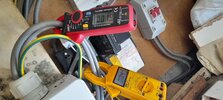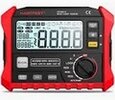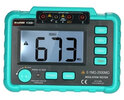You should start your own thread, as answer to you
@roystaan67 may not be the same as answer to
@Sion Whellens, although it seems he is no longer on the forum.
But we are allowed between 15 mA and 30 mA to trip the RCD within 40 ms, in the main around 27 mA is common, the background leakage can be up to 30% so 9 mA, so an oven may trip with just 6 mA if already at the limit, so we need to measure.

Clearly here one meter is wrong, likely the yellow one as getting rather old, but showing 15 mA so if I was using a single RCD I would be well over the background leakage allowed, I actually have 14 RCBO and two RCD sockets so for me will within what is allowed.
The next is to see if the RCD is OK,

with another tester, and if OK can test the appliance using DC but since the appliance uses AC, this is a bit hit-and-miss, and yet another tester

so looking at around £150 to get the test gear, so in the main, people guess.





